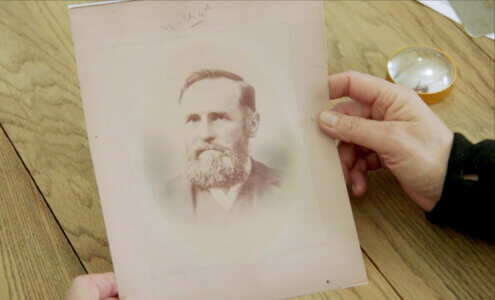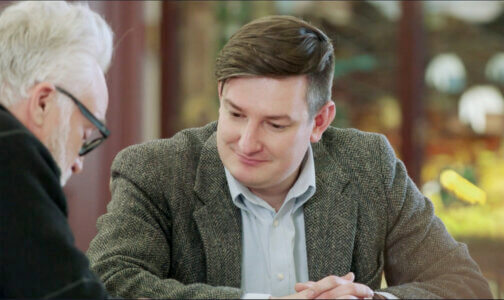WATCH THE FULL EPISODE
By TYLER ELLYSON
UNK Communications
KEARNEY – Actor Bradley Whitford’s journey to trace his ancestry started in sunny California and ended at a snow-covered Nebraska cemetery.
Along the way, he met several experts who helped him uncover his family history, including a University of Nebraska at Kearney faculty member.
UNK assistant history professor Nathan Tye appeared with Whitford on the most recent episode of “Who Do You Think You Are?” an NBC show that follows celebrities as they search for information about their ancestors.
The episode, which aired 6 p.m. Sunday, focuses on Whitford’s great-great-grandfather Frederick Neu and the events that brought him from Prussia to Nebraska City in the 1800s.
Whitford learns that Neu immigrated to the United States as a teenager in 1846 and the family settled in Indiana. In August 1862, Neu and two younger brothers, Valentine and John, volunteered to serve with the 83rd Indiana Infantry Regiment, which fought for the Union Army during the Civil War.
At Vicksburg National Military Park in Mississippi, Whitford describes a “weirdly serene” moment while standing atop a hill overlooking the battlefield.
“It’s amazing to think that these three brothers were here. And if they’d have died that day, nothing that followed them would have happened,” said Whitford, whose acting credits include “The West Wing,” “The Handmaid’s Tale,” “Brooklyn Nine-Nine,” “Get Out,” “Godzilla: King of the Monsters,” “Billy Madison” and “Philadelphia.”

Following the war, Neu moved to southeast Nebraska. That’s where Whitford and Tye met for filming.
With specializations in Nebraska, American West and Midwest history, the UNK faculty member filled in the blanks from 1870 on.
“For him, it was a huge risk to invest what little capital he had to bring his family out here,” Tye says in the show.
Sitting at a table inside the G.A.R. Memorial Hall and Civil War Veterans Museum in Nebraska City, Tye tells Whitford that his great-great-grandfather was a member of the Grand Army of the Republic, a fraternal organization for Union veterans. The local chapter met in that building – the chairs haven’t changed – and Neu’s funeral was held there in October 1910.
“I think that was a particularly powerful moment for him to be in that place,” said Tye, who also presented a couple black-and-white photos of Neu and his family, which included his wife Charlotte and nine children.
Neu was “one of the wealthiest and best-known farmers” in the area, according to his death notice in the Nebraska City News. Whitford called his life a “classic immigrant success story.”
“It’s interesting because it’s the American dream, but it ain’t easy,” he says on the episode.
In his final scene, Tye tells the famous actor, “You gotta go meet Fred,” before directing him to the nearby Wyuka Cemetery where Neu is buried.
For Tye, who watched Sunday’s premiere with his parents Tom and Mikki, the network television appearance was an enjoyable experience.
“I’ve gotten very positive responses from my colleagues, from students, from folks in the community and a couple of genealogists asking for some help,” he said with a smile.
The assistant professor also hopes the show and his 15 minutes of fame help shine a spotlight on local and state history and the importance of preserving these stories.
“It gets some play because obviously Bradley Whitford is more well-known than Jane or John Doe who are looking for their relative, but others can find these stories,” Tye said. “These stories are everywhere. They’re here in Buffalo County. They’re in any county in the state, any community in the state.”
“I hope it underscores that there is value in what I teach, what I have students do and the places I’m taking them to,” he added. “And that it’s a little cool.”
As Whitford says in the show, “It makes you realize the history’s here. It doesn’t die.”


